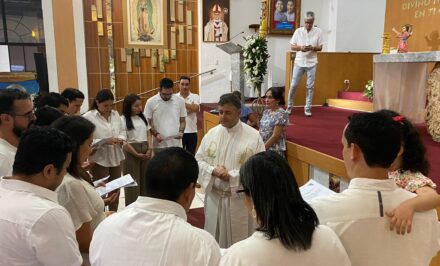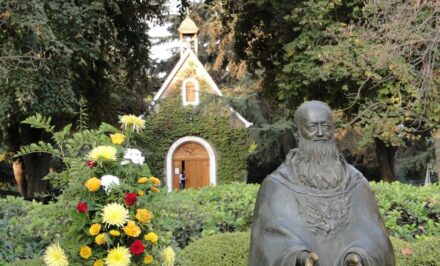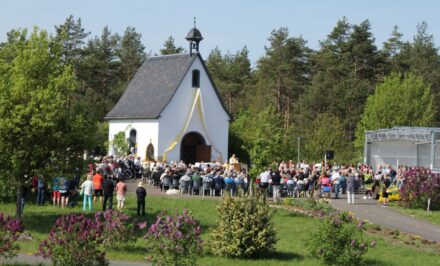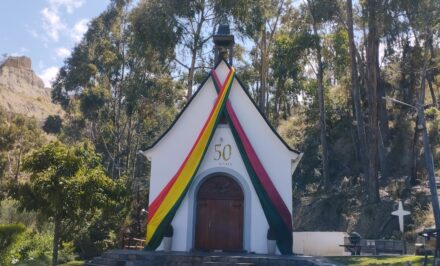
 FACKELLAUF 2014, mda. Until now in Schoenstatt, there has only been one rainy night before the real beginning of the Jubilee pilgrimage, and otherwise contrary to the weather forecast in Schoenstatt, a radiant sun and temperatures are almost summer-like while pilgrims – some of whom are dressed warmly just in case – arrived in Schoenstatt and going on pilgrimage to the Original Shrine. Meanwhile the burning torch, the symbol of the fire of the Covenant of Love is running through rain and storms to arrive on time for the Jubilee vigil in Schoenstatt. Since October 15th, the torch runners are in the final stretch, supported through encounters with the members of the Schoenstatt Family from Switzerland in Brunnen and the Schoenstatt Movement from Freiburg, by Archbishop Emeritus Dr. Robert Zollitsch and Auxiliary Bishop Dr. Michael Berber, who also ran one leg.
FACKELLAUF 2014, mda. Until now in Schoenstatt, there has only been one rainy night before the real beginning of the Jubilee pilgrimage, and otherwise contrary to the weather forecast in Schoenstatt, a radiant sun and temperatures are almost summer-like while pilgrims – some of whom are dressed warmly just in case – arrived in Schoenstatt and going on pilgrimage to the Original Shrine. Meanwhile the burning torch, the symbol of the fire of the Covenant of Love is running through rain and storms to arrive on time for the Jubilee vigil in Schoenstatt. Since October 15th, the torch runners are in the final stretch, supported through encounters with the members of the Schoenstatt Family from Switzerland in Brunnen and the Schoenstatt Movement from Freiburg, by Archbishop Emeritus Dr. Robert Zollitsch and Auxiliary Bishop Dr. Michael Berber, who also ran one leg.

The language barrier was overcome before conquering crossing the Gotthardt Pass. On the Fackellauf Blog and Facebook, they joyfully speak Spanish, English, Italian, and Polish along with German; schoenstatt.org translated the rest and the world was present. Fackellauf, which began on October 18th with Pope Francis blessing the torch, is more and more international along with the Fackellauf logo, that of Ignis and of the Missionary Generation. The weather in northern Italy and Switzerland was terrible, but the torch was not extinguished. It continued to burn, it the runners continued to carry it while they went up the crossing at the Gotthardt Pass and then coming down, in the direction of Schoenstatt. “We want the challenge,” the eighty-five youths said. In the many photos and videos, they can be seen running with the burning torch through the rain. And the Schoenstatt Family runs with them…
“We want the challenge!”
“Life prepares the most different challenges for us,” one of the youths wrote. “We, human beings, try to maneuver in the best way possible with the least effort and the least risk of loss through these moments.”
But with our project we try something new!
We do not want to continue to face imposed situations!
We do not want to continue to seek a road that is advantageous for US!
We do not want to continue on the easiest road!
We dared to face a challenge – voluntarily – in a natural way and nevertheless, with a joyful heart.
It would have been much easier to transport the torch in an auto. But, it is precisely because we do not want that easy road – we want a “modern” way of going on pilgrimage: running!
We want to sweat!
We want physical weariness!
We want it to hurt!
We want to run for OTHERS!
We want the challenge!
For the Ebola victims and for the volunteers
 Laughing and free of worries, we carry the torch through the Alps, while the number of deaths from Ebola goes through the clouds and the fear of infection grows, half of Germany is stopped by striking train engineers, the stock market crashes, the Synod of Bishops cause an “earthquake” and the students in Nigeria disappeared six months ago. The Schoenstatt “Tabor syndrome?” as Dr. Carlos Ferré from Buenos Aires says. No way.
Laughing and free of worries, we carry the torch through the Alps, while the number of deaths from Ebola goes through the clouds and the fear of infection grows, half of Germany is stopped by striking train engineers, the stock market crashes, the Synod of Bishops cause an “earthquake” and the students in Nigeria disappeared six months ago. The Schoenstatt “Tabor syndrome?” as Dr. Carlos Ferré from Buenos Aires says. No way.
The runner, carrying it through the rain, also carries a petition. “For the victims of Ebola and the volunteers.” He runs for this to the point of exhaustion.
Concrete family

The Swiss Schoenstatt Family prepared a warm welcome for the torch runners; the following day, Melanie and Ulli Grauert, who were the way to Schoenstatt, sent the first videos of the encounter. A lady in the Movement met one of the torch runners and she took a photo of him, which reached the public on Facebook.
And at the same moment the first large groups of pilgrims landed in Frankfurt, the torch had reached Germany. It is on the way toward the Vocation Shrine in Friburg-Merzhausen. “What a warm welcome,” the press team published, and it added: “The rest of the torch runners left nourished with sandwiches throughout the afternoon provided by the Schoenstatt Family. Now we are all together, and we are happy about another great night.” And that is how it was – a Mass with Archbishop Emeritus Robert Zollitsch and Auxiliary Bishop Michael Gerber and something impressive – “the leaders of the Girls’ Youth carried the torch with impressive speed toward the Seminary, where the torch runners spent the night.” Upon her return, Lara wrote: “Thank you because we were able to participate! We wish them a good race – we will see you in Schoenstatt!” And the Auxiliary Bishop Michael Gerber ran a leg “at a good pace,” commented an expert.
In Bühl, fifteen soldiers from Bruchsal took the torch – the goal after four hours and 50 kilometers– Karlsruhe, where the torch was taken again. “Thank you very much to the Schoenstatt Boys’ Youth for the hospitality and warm welcome!” the soldiers wrote. While the soldiers were on the road for the Falkellauf, a sister who was in a car saw the torch runners’ car. She turned back, and she approached them. “Thank you for this fantastic encounter and for a part of the shopping that she spontaneously gave us for strength at midday. It is simply hard to believe the kindness that we have been shown everywhere.”
We are proud of being torch runners
At a given moment the point arrived. This point that makes us feel proud of what we do. We feel proud to be called “Torch runners.”
What in the beginning was only a concept that we tried to define then became a clear vision.
Suddenly we clearly saw who we are, what we do and why we do it.
The first days of our trip seemed to be only a sensation, but now the blindfold has fallen from our eyes.
We are torch runners! And we are proud of taking this torch – that light – to Schoenstatt!
We are proud to run for the people’s petitions and letting our feet burn.
Every blister on our feet becomes a mark that we carry with pride!
They had told all of this before, but now we have understood it!
In our style, we want to enroll in the “Hall of Fame”.
We want to be students and to learn from Father Kentenich.
We want to be teachers and give what we have learned
We want to be politicians and shape the world.
We want to be preachers and speak about our faith.
We want to be believers and to trust in God.
We want to be leaders and show the road to God.
We want to be astronauts and reach the stars.
We want to be winners and demonstrate our mission.
We want to be seekers of the truth!
We want to show that we have the ability to create some extraordinary, something special. We do it for us, but nonetheless, we have others in our sight.
We run and we carry the petitions of so many people on our way. We are proud to be torch runners.
Schoenstatt setting out
Schoenstatt is proud of having torch runners. And in the grace of 2014, perhaps, we hope, no, with all certainty: to be a torch runner. Schoenstatt is setting out– a torch runner for the next 100 years and beyond perhaps.
With people’s petitions in heart and hand.

It was born in 1914 on the battle front of a world war. A war that became the cradle for a Schoenstatt “that goes out” as Pope Francis says, which today knows and should respond to his call to go out “onto the streets.” It goes out from the shrine in the small valley, from its own community bringing a hope that is not utopian, but is expressed through practical activities and evangelical projects that are life giving and restore the dignity of the human person, irrespective of where he finds himself. Even at the “peripheries,” Schoenstatt is called to be there with all of the associated risks and dangers.
10/18/2014. We want the challenge.
Original: German – Translation Celina M. Garza, San Antonio, TX USA
















